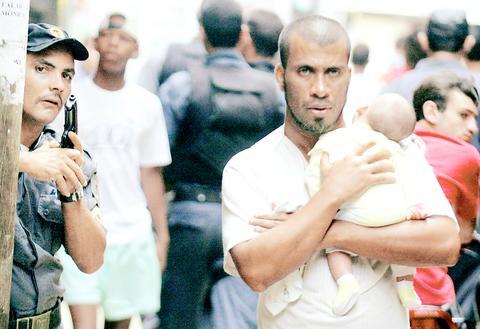Resident of Rio's slums tried to go about their business, shaken by four days of deadly gunbattles with drug gangs and attempts by police to bring calm to the sprawling squalid communities. Rio's state governor, meanwhile, asked the federal government for 4,000 army troops to help keep the peace in the shantytowns.
In a letter to the country's justice minister Tuesday, Governor Rosinha Matheus said she would accept soldiers in the shantytowns, but federal officials denied there were any plans to send troops here.
No violence was reported Tuesday in the Rocinha and Vidigal hillside favelas, or shantytowns, where fighting between drug-trafficking gangs has killed at least 10 people, some bystanders, since Friday.

PHOTO: REUTERS
Police reportedly were combing the nearby Atlantic forest for gang members who fled when police stormed into the favelas Monday.
About 1,300 armed police were deployed to keep the peace, but residents said they felt the cease-fire was temporary at best.
"Today it is calm. What about tomorrow?" asked Antonio Trajano, a shantytown shopowner. "These days have been a terrible experience, and people will remain afraid for a long time."
The atmosphere in the shantytown Tuesday was bustling: loudspeakers blared advertising while merchants hawked wares from carts full of fish, meat, cloth and toys.
Residents say the government must invest time and money to keep the peace.
"Ninety-nine percent of the population are honest people, but still there is fear when you cross the sidewalk or a bridge," said William de Oliveira, president of the Rocinha neighborhood association. "What is needed here are long-term policies to boost education, sports and investments that provide jobs."
The war erupted Friday, when a drug gang tried to seize control of the rich drug-selling points on Rocinha's upper hills.
The commando-style invasion set off alarms across Brazil's main resort city, where drug violence rarely disturbs the wealthy neighborhoods.
But Rocinha and Vidigal are just a few hundred yards [meters] from trendy beaches, luxurious hotels and condominiums.
"Drug gangs are almost always fighting for territory," said Rubem Cesar Fernandes, president of the human rights group Viva Rio. "The difference is that this time it happened in slums which are part of the `beautiful' side of Rio."
In Brasilia, federal lawmakers from Rio de Janeiro state met with Justice Minister Marcio Thomaz Bastos to ask the government to intervene in the state.
"There is a clear lack of authority. There is a problem constituted by the difficulty of the governor to fire her security secretary, who has lost control of the situation," Representative Lindberg Farias, of the governing Workers' Party, was quoted as saying by the O Globo news agency.
Rio state security secretary Anthony Garotinho, who is also the governor's husband, proposed that elite troops occupy eight of Rio's most violent slums until 4,000 new police could be trained to take their place.
In a statement, the defense ministry denied media reports that there was an agreement to send troops to Rio. If troops were sent in, the army would decide how and where they would be deployed, the statement said.

Auschwitz survivor Eva Schloss, the stepsister of teenage diarist Anne Frank and a tireless educator about the horrors of the Holocaust, has died. She was 96. The Anne Frank Trust UK, of which Schloss was honorary president, said she died on Saturday in London, where she lived. Britain’s King Charles III said he was “privileged and proud” to have known Schloss, who cofounded the charitable trust to help young people challenge prejudice. “The horrors that she endured as a young woman are impossible to comprehend and yet she devoted the rest of her life to overcoming hatred and prejudice, promoting kindness, courage, understanding

Tens of thousands of Filipino Catholics yesterday twirled white cloths and chanted “Viva, viva,” as a centuries-old statue of Jesus Christ was paraded through the streets of Manila in the nation’s biggest annual religious event. The day-long procession began before dawn, with barefoot volunteers pulling the heavy carriage through narrow streets where the devout waited in hopes of touching the icon, believed to hold miraculous powers. Thousands of police were deployed to manage crowds that officials believe could number in the millions by the time the statue reaches its home in central Manila’s Quiapo church around midnight. More than 800 people had sought

DENIAL: Pyongyang said a South Korean drone filmed unspecified areas in a North Korean border town, but Seoul said it did not operate drones on the dates it cited North Korea’s military accused South Korea of flying drones across the border between the nations this week, yesterday warning that the South would face consequences for its “unpardonable hysteria.” Seoul quickly denied the accusation, but the development is likely to further dim prospects for its efforts to restore ties with Pyongyang. North Korean forces used special electronic warfare assets on Sunday to bring down a South Korean drone flying over North Korea’s border town. The drone was equipped with two cameras that filmed unspecified areas, the General Staff of the North Korean People’s Army said in a statement. South Korea infiltrated another drone

Cambodia’s government on Wednesday said that it had arrested and extradited to China a tycoon who has been accused of running a huge online scam operation. The Cambodian Ministry of the Interior said that Prince Holding Group chairman Chen Zhi (陳志) and two other Chinese citizens were arrested and extradited on Tuesday at the request of Chinese authorities. Chen formerly had dual nationality, but his Cambodian citizenship was revoked last month, the ministry said. US prosecutors in October last year brought conspiracy charges against Chen, alleging that he had been the mastermind behind a multinational cyberfraud network, used his other businesses to launder